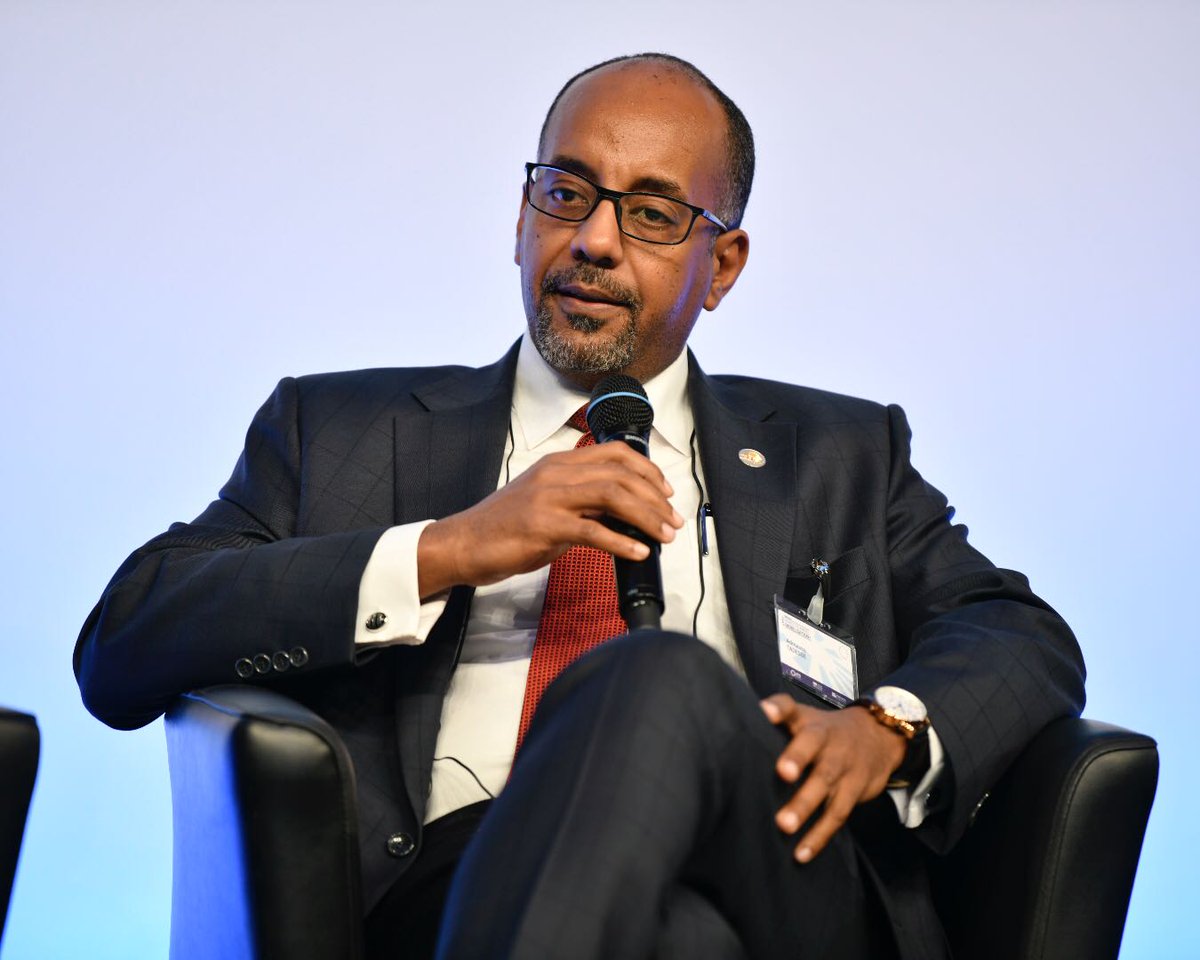
Fortune News | Mar 07,2020
Ahadu Bank’s founding President, Eshetu Fantaye, is bullish about the Bank's prospects despite cutthroat competition for equity and deposit in times of economic hardship.
He wants to see Ahadu’s branch network expand to 50 by October, from three median branches planned to open next week.
Eshetu has a daunting task ahead of him. A father of three, he boasts a long career in finance, which he and Ahadu’s shareholders hope can be leveraged to succeed in the industry.
He did his undergraduate studies in economics at Addis Abeba University in the early 1990s before completing a fellowship programme at Boston University in the United States. He studied international trade and finance for his post-graduate at the University of Rome Tor Vergata. Like many in the industry, Eshetu began his career at the state-owned Commercial Bank of Ethiopia (CBE), gradually climbing the corporate ladder to the Vice President position.
He took a hiatus from banking, working for a California-based ICT firm (Transnational Computer Technology), owned and managed by Wondwossen Mesfin, the son of Mesfin Sileshi (Ras). Eshetu, a highly regarded executive among insiders of the banking industry, reappeared as a Vice President for Awash Bank in 2006. Four years later, he was appointed President of Bunna Bank, where he served for nearly six years.
Eshetu says Ahadu plans to focus on untapped and little contested potential, gearing its services to mass markets such as farmers and pastoralists as well as micro-enterprises and informal businesses.
“We aren’t trying to penetrate the existing market,” Eshetu told Fortune.
The domestic banking industry has 19 private and two state-owned banks, where the CBE and Awash International Bank (AIB) are leaders.
Ahadu Bank S.C. is the latest to join Ethiopia’s banking industry after securing operation permits from the central bank last month. It is one of half a dozen at the cusp of entering the market, meeting the National Bank of Ethiopia’s (NBE) requirement for the minimum capital threshold of half a billion Birr.
Other banks lined up to join the financial sector include Tsehay, Shabelle and Ramis, Tsedey and Siinqee. The latter two have evolved from microfinance institutions. Amhara Bank began commercial operations last month, mobilising close to six billion Birr in paid-up capital.
Rammis Bank is joining the industry after raising half a billion Birr in equity before the deadline last November. Its promoters have thus far mobilised over 800 million Br in paid-up capital from 8,000 shareholders. Last week, central bank regulators approved the nomination of Ali Ahmed, who worked for the state-owned CBE as chief of staff since 2020, as an acting president of Rammis Bank. Ali has over two decades of experience in the banking industry, most of which was at Awash Bank. Rammis executives plan to start operations in September.
Ahadu has less equity at a little over 702 million Br in subscribed by close to 10,000 shareholders; promoters have raised 564 million Br in paid-up equity. They will need to raise capital by nearly 10-fold in the next six years to meet the central bank’s capital threshold requirements. Ahadu’s executives plan to launch operations with three branches in the coming week, including its main branch and headquarters in Sunshine Building, on Africa Avenue (Bole Road).
Abdulmenan Mohammed, a financial statement analyst keeping a close watch on the financial sector, has doubts.
“Except for a few new entrants, which have already raised substantial capital, meeting the threshold will be tough without mergers,” said Abdulmenan.
A broader economic downturn, galloping inflation, political uncertainty, conflict, war and drought are the scourages plighting Ethiopia’s economy.
“The Bank can meet the minimum capital requirement in three to four years,” Eshetu told Fortune.
It is an ambition of the tallest order.
Raising equity is not the only challenge for entrants like Ahadu Bank. They have to deal with an increasingly saturated market, where long-standing banks are increasingly pressed to innovate to gain or retain market share. The number of private commercial banks (including those that have yet to launch operations) has grown to over two dozen.
“The biggest challenge for the newcomers will be securing a market share sufficient to earn decent returns,” said the financial expert.
Executives are not the only ones upbeat.
Anteneh Sebsibe, the board chairperson, is confident Ahadu will succeed in the industry. Anteneh also has decades of experience in finance. He joined the Bank of Abyssinia (BoA) as a banking officer in 1999 after completing his graduate studies in business administration and management at St. Mary’s University. He served Abyssinia for two decades, becoming chief operations officer in 2016.
He is self-employed and works as Managing Director of NextGen Finance & Management Consultancy.
Anteneh foresees Ahadu Bank will play a role in filling financing gaps and improving the limitations visible in the financial sector. Two-thirds of the Ethiopian population is unbanked, according to a study conducted by the World Bank in 2019.
“We’ll focus on half of the country that doesn’t have access to banking,” said Anteneh.
Shareholders, too, are optimistic.
Yoseph Desta is one of the Bank’s major shareholders. The businessperson and father of two hold significant shares in Memagi Medical Imports Plc, an authorised medical equipment distributor from brands such as Philipps Healthcare and Carl Zeiss. Yoseph is also the major shareholder at Geki Star Trading Plc, which exports coffee, oilseeds, pulses and spices; and imports pharmaceuticals and animal feed.
He told Fortunehe was attracted to invest in Ahadu Bank by the prospect of enormous potential in digital banking services.
Other industry entrants have a similar line of thought.
Amhara Bank executives eye digitalisation and access to chronically underfinanced segments and businesses in the economy. The Bank has established a development financing division to facilitate its policy, according to Aschalew Tamiru, director of marketing and branding at the Bank.
PUBLISHED ON
Jul 09,2022 [ VOL
23 , NO
1158]

Fortune News | Mar 07,2020

Commentaries | Jul 13,2020

Radar | Oct 20,2024

Exclusive Interviews | Nov 21,2018

Radar | Sep 27,2020

Editorial | Sep 08,2024

Commentaries | Dec 11,2020

Radar | Jul 06,2025

Radar | Jan 03,2021

My Opinion | May 11,2024

Dec 22 , 2024 . By TIZITA SHEWAFERAW
Charged with transforming colossal state-owned enterprises into modern and competitiv...

Aug 18 , 2024 . By AKSAH ITALO
Although predictable Yonas Zerihun's job in the ride-hailing service is not immune to...

Jul 28 , 2024 . By TIZITA SHEWAFERAW
Unhabitual, perhaps too many, Samuel Gebreyohannes, 38, used to occasionally enjoy a couple of beers at breakfast. However, he recently swit...

Jul 13 , 2024 . By AKSAH ITALO
Investors who rely on tractors, trucks, and field vehicles for commuting, transporting commodities, and f...

Oct 11 , 2025
Ladislas Farago, a roving Associated Press (AP) correspondent, arrived in Ethiopia in...

Oct 4 , 2025
Eyob Tekalegn (PhD) had been in the Governor's chair for only weeks when, on Septembe...

Sep 27 , 2025
Four years into an experiment with “shock therapy” in education, the national moo...

Sep 20 , 2025
Getachew Reda's return to the national stage was always going to stir attention. Once...